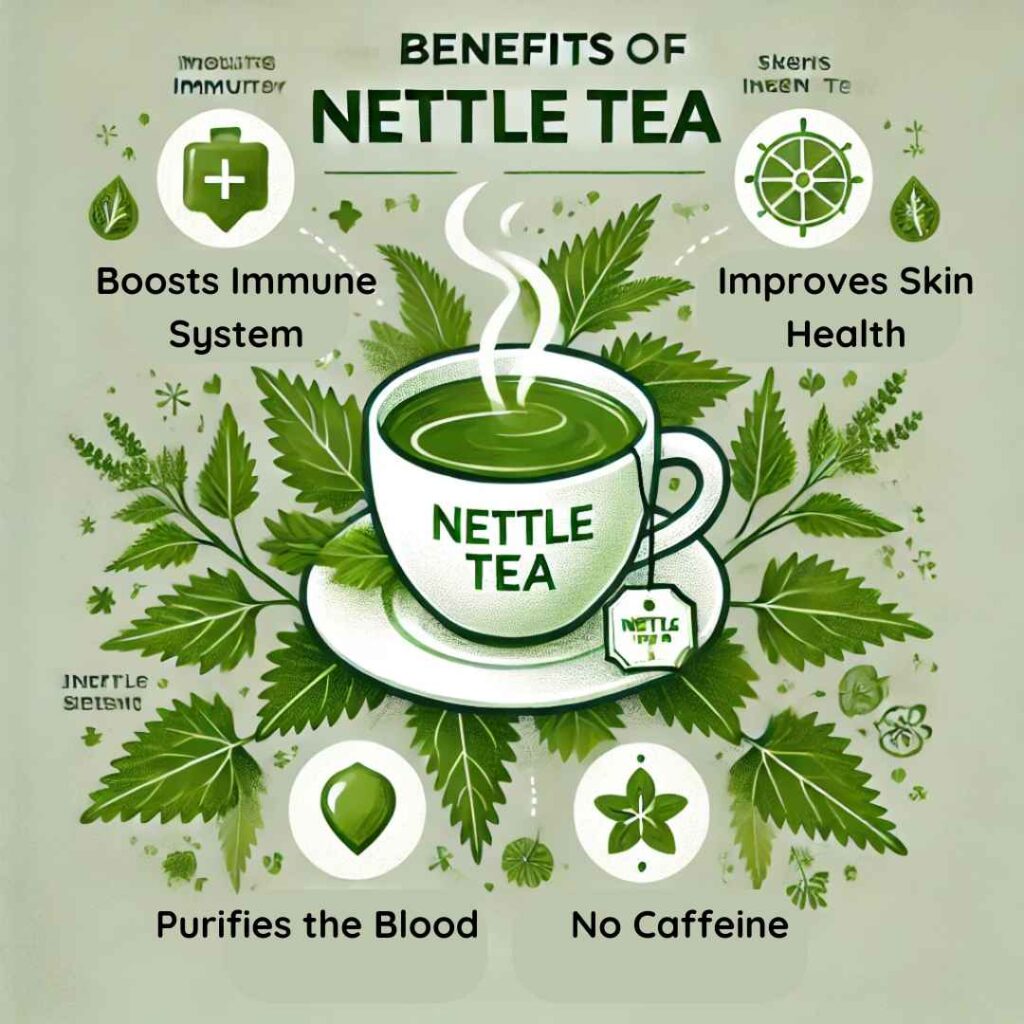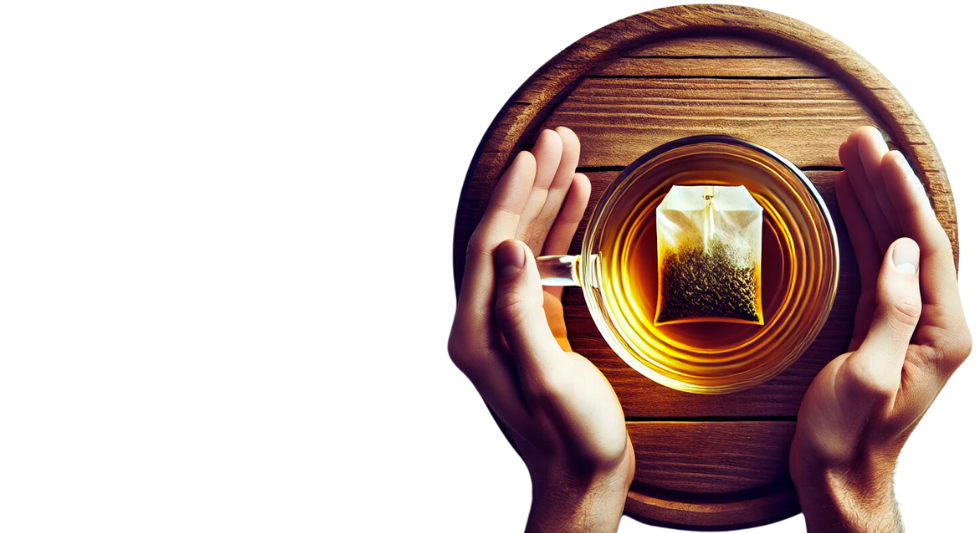Introduction
Nettle tea is an herbal infusion made from the leaves of the stinging nettle plant (Urtica dioica), known for its healing properties for centuries. As more people shift towards natural remedies, nettle tea has become a popular choice due to its numerous health benefits. In this blog, we’ll explore the uses, benefits, side effects, and guide you on how to prepare nettle tea properly at home.
Let’s dive in!
What is Nettle Tea?

Nettle tea is brewed from the dried leaves of the stinging nettle plant. While the plant itself may irritate when touched, once dried and steeped, it transforms into a nutrient-rich beverage packed with vitamins, minerals, and antioxidants.
Nettle Tea Uses
Nettle tea has been traditionally used for a wide range of health purposes. Here are some of the most popular uses of nettle tea:
Anti-Inflammatory Properties
Nettle tea is commonly used for reducing inflammation in the body. It’s been shown to help with conditions like arthritis, muscle pain, and even joint discomfort.
Allergy Relief
Nettle tea is known for its ability to relieve seasonal allergies like hay fever. Compounds in nettle can help reduce histamine production, alleviating symptoms such as sneezing, itching, and runny nose.
Supporting Kidney and Urinary Health
Due to its diuretic properties, nettle tea is often used to support kidney function and alleviate urinary tract infections (UTIs). It helps in flushing out toxins from the body and may help prevent kidney stones.
Promotes Skin Health
Nettle tea is also used topically or consumed for skin conditions like eczema and acne. Its anti-inflammatory and astringent properties help reduce redness and irritation, leading to clearer, healthier skin.
Hair Growth and Scalp Health
Nettle tea is rich in vitamins and minerals that promote hair health. Some people use nettle tea as a hair rinse to improve scalp conditions and encourage hair growth.
Health Benefits of Nettle Tea

Nettle tea is more than just a remedy for specific ailments. It offers a broad range of health benefits:
- Rich in Nutrients
Nettle leaves are a powerhouse of nutrients, including vitamins A, C, K, and several B vitamins. They are also a good source of minerals like calcium, iron, magnesium, and potassium. - High in Antioxidants
Antioxidants help combat oxidative stress and reduce the risk of chronic diseases like heart disease and cancer. Nettle tea is full of flavonoids, carotenoids, and phenolic acids, which provide strong antioxidant effects. - Supports Bone Health
Nettle tea’s high calcium and magnesium content make it excellent for bone health. Regular consumption may help strengthen bones and prevent conditions like osteoporosis. - Lowers Blood Pressure
Nettle tea has a mild diuretic effect that may help reduce blood pressure by promoting the removal of excess salt and water from the body. - Balances Hormones
Nettle tea is sometimes used to balance hormone levels, particularly in women. It may help relieve PMS symptoms and menopausal discomfort, and even improve fertility.
Possible Side Effects of Nettle Tea
While nettle tea is generally safe for most people, there are some side effects to be aware of:
- Allergic Reactions
Some people may be allergic to nettle, experiencing symptoms such as rash, hives, or difficulty breathing. If you’re allergic to plants like ragweed or daisies, exercise caution. - Stomach Issues
In some cases, nettle tea can cause mild digestive issues such as upset stomach or diarrhea, particularly when consumed in large amounts. - Interactions with Medications
Nettle tea may interfere with medications, especially blood thinners, diuretics, or drugs for controlling blood pressure and diabetes. It’s always a good idea to consult your doctor if you’re on medication before adding nettle tea to your daily routine. - Pregnancy and Breastfeeding
Nettle tea is not recommended for pregnant or breastfeeding women without medical supervision, as it can stimulate uterine contractions.
How to Make Nettle Tea (Procedure)

Making nettle tea is simple and only requires a few basic steps:
Ingredients to Make Nettle Tea
- 1-2 teaspoons of dried nettle leaves (or 5-6 fresh leaves if available)
- 1 cup of boiling water
- Honey or lemon (optional, for taste)
Steps to Make Nettle Tea
- Boil water and pour it over the nettle leaves in a teapot or mug.
- Let the leaves steep for 5-10 minutes. The longer you steep, the stronger the flavor.
- Strain the tea into a cup and discard the leaves.
- Add honey or lemon for additional flavor if desired.
- Enjoy your nutritious, refreshing cup of nettle tea!
For the best experience, use the best quality Nettle Tea bags from Northerb.
Conclusion
Nettle tea is a powerhouse of health benefits, offering support for everything from inflammation and allergies to skin health and bone strength. Its rich nutrient profile and natural healing properties make it an excellent choice for those looking to boost their wellness with herbal remedies. While it’s generally safe for most people, it’s essential to be aware of any possible side effects or interactions with medications.
Whether you’re drinking it to alleviate allergies, improve your skin, or just enjoy a nourishing herbal tea, nettle tea is a wonderful addition to any routine. Brew yourself a cup today and experience the natural benefits for yourself!
Nettle Tea FAQs
Q: Can I drink nettle tea every day?
Yes, nettle tea can be consumed daily. However, moderation is key. It’s best to drink 1-2 cups per day and consult with a healthcare professional if you plan on drinking it regularly, especially if you’re on medication.
Q: Where can I buy nettle tea?
You can find dried nettle leaves or pre-packaged nettle tea bags in most health food stores, online retailers, or herbal shops.
Q: Can nettle tea help with weight loss?
While nettle tea is not a direct weight-loss aid, its diuretic properties can help reduce water retention and bloating, making you feel lighter. Combined with a healthy diet and exercise, it may contribute to overall well-being.
 Français
Français 






